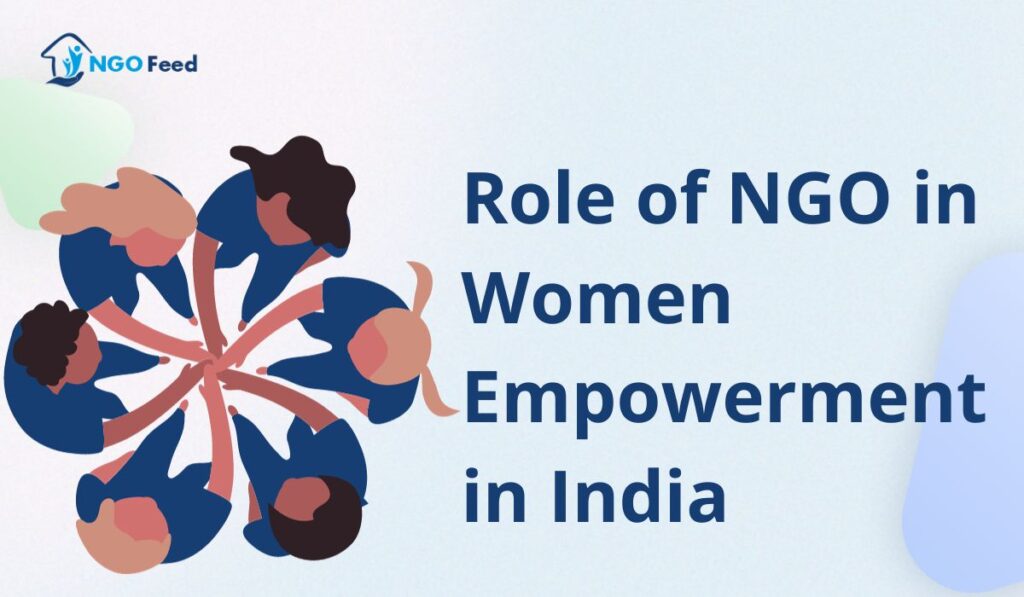Role of NGO in Women Empowerment in India: Imagine a place where girls were once told they couldn’t go to school and women were limited to their homes. You can also imagine that place where people murder the unborn baby before their birth because they don’t want a girl child; their thinking is if a girl child is born, they have to pay lots of drow for her marriage, and they’re not stopping here they want will be good to educate the girl child. These are just examples of millions of reasons why girls survive for their lives. Now, visualise how this changes slowly but steadily. In India, this transformation is happening thanks to notable organizations called NGOs. They play an essential Role of NGO in Women’s Empowerment. These nonprofit organizations are like superheroes, fighting for the rights and well-being of women. Let’s look at how these NGOs are making a big difference.
Table of Contents
What is Women’s Empowerment?
Women’s empowerment emerged in the 1980s and 1990s as a radical approach to transforming power relations favouring women’s rights and greater equality between women and men (Batliwala, 1993, 2007). Women empowerment empowers women to control their lives and make their own choices. When women are empowered, they are more likely to be educated, healthy, and have a higher income. They are also more likely to participate in decision-making and have a more significant say in their lives.
Role of NGO in Women’s Empowerment in India
In this section, we provide the Role of NGOs in Women’s Empowerment in India, from getting girls to school to their lives.
1. Getting Girls to School
In many regions of India, girls used to stay home while boys went to school. NGOs decided to change this. They started opening schools for girls, making education accessible. Girls learned to read, write, and dream of a better future. This simple step opened doors that were once closed tight.
2. Teaching Skills
Imagine being able to support yourself and your family. NGOs provide training and teach various skills like sewing, crafting, knowledge of computers, making sanitary pads, farming, etc. These skills help women find jobs or even start small businesses.
3. Health Care
Being healthy is essential. NGOs set up health clinics and mobile units, reaching remote areas. They provide important services for women and young girls, like regular health check-ups, the use of pads, and how they save themselves on their menstruation cycle. By caring for their health, women can focus on building a better future for themselves and their families.
Also Read: Top 10 NGOs in India by NGOFeed Ranking 2024
Women’s Rights
Many women don’t know their rights. Nonprofit organizations help them understand the laws that protect them. They offer legal advice and support. This knowledge empowers women to stand up against injustices like domestic violence. With NGOs by their side, they are not alone in their fight.
Schemes For Women
The Ministry of Women and Child Development is implementing various schemes/ programmes to bring women into the mainstream of all the sectors in the country to empower them. The details are as follows:
- One Stop Centre and Universalization of Women Helplines
- Swadhar Greh Scheme
- Ujjawala Scheme
- Working Women Hostel
- Beti Bachao Beti Padhao (BBBP)
- Mahila Shakti Kendra (MSK)
- Pradhan Mantri Matru Vandana Yojana (PMMVY)
Feature of NGOs
NGOs are focused on improving the socio-economic conditions of the people they work with. The following are the important characteristics that an NGO requires to have to be effective:
| Voluntary | Legal Status |
| Independent | Flexible |
| Quicker in decision-making | High motivation |
| Freedom in Work | Catalytic |
| People-Centred | Non-profit oriented |
Frequently Asked Questions (FAQs)
What is the main objective of NGOs working for women’s empowerment in India?
NGOs working for women’s empowerment in India aim to uplift and support women in various aspects of their lives. This includes providing access to education, healthcare, vocational training, legal awareness, and economic opportunities. NGOs aim to break societal barriers and stereotypes, ensuring women have the knowledge, skills, and confidence to lead independent and fulfilling lives.
How do NGOs contribute to women’s education in India?
NGOs contribute to women’s education in India by establishing schools and scholarship programs for girls. They also conduct awareness campaigns to promote the importance of education for girls.
What role do NGOs play in promoting women’s health in rural India?
NGOs are vital in promoting women’s health in rural areas of India by setting up healthcare facilities such as clinics and mobile health units. NGOs also conduct awareness campaigns on hygiene, nutrition, and sanitation, empowering women to make informed decisions about their health and well-being.
How do NGOs help women in India gain economic independence?
NGOs help women in India gain economic independence by providing vocational training and skill development programs. NGOs also offer microfinance programs, providing small loans and financial literacy training, which empower women to initiate and expand small businesses, thereby reducing financial dependence.
What impact do NGOs have on changing societal attitudes towards women in India?
NGOs significantly impact changing societal attitudes towards women in India through awareness campaigns, community engagement programs, and educational initiatives. NGOs also conduct workshops and discussions, encouraging dialogue around gender equality, female empowerment, and women’s rights.

